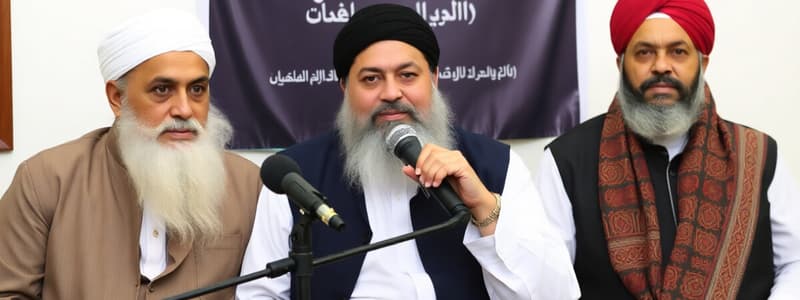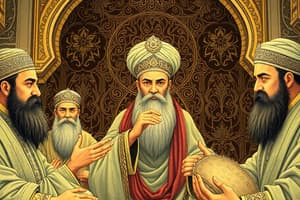Podcast
Questions and Answers
Given Maulana Fazlullah's exploitation of post-earthquake trauma to disseminate his ideology, which psychosocial mechanism most accurately elucidates the populace's susceptibility to his influence, considering the interplay between collective anxiety and perceived securitization?
Given Maulana Fazlullah's exploitation of post-earthquake trauma to disseminate his ideology, which psychosocial mechanism most accurately elucidates the populace's susceptibility to his influence, considering the interplay between collective anxiety and perceived securitization?
- Operant conditioning, rewarding active participation in TNSM activities.
- Classical conditioning, wherein repeated exposure to Fazlullah's voice during aid distribution created a positive association.
- Cognitive dissonance reduction, as aligning with Fazlullah mitigated the psychological discomfort of societal collapse and uncertainty. (correct)
- Stockholm Syndrome, where prolonged exposure to the Radio Mullah led to the population developing affection for their captor.
Considering Malala's father's initial assessment of the Radio Mullah as 'nonsense and trouble' despite the public's romanticization of him, delineate the cognitive bias that most likely influenced the community's perception, overlooking the absence of formal religious credentials and the propagation of fear-inducing rhetoric?
Considering Malala's father's initial assessment of the Radio Mullah as 'nonsense and trouble' despite the public's romanticization of him, delineate the cognitive bias that most likely influenced the community's perception, overlooking the absence of formal religious credentials and the propagation of fear-inducing rhetoric?
- Availability heuristic, where frequent broadcasts made individuals overemphasize the importance of the Radio Mullah.
- Anchoring bias, where initial exposure set a positive perception of the Mullah.
- Confirmation bias, as individuals were more likely to accept information confirming their beliefs.
- Halo effect, where perceived charisma overshadowed any doubts regarding his legitimacy or intentions. (correct)
Assuming Maulana Fazlullah's pronouncements had the power of de jure legislation, and given his objective to establish a theocratic legal system, which tenet of modern jurisprudence would be most severely compromised, considering the potential erosion of individual liberties under religiously prescriptive edicts?
Assuming Maulana Fazlullah's pronouncements had the power of de jure legislation, and given his objective to establish a theocratic legal system, which tenet of modern jurisprudence would be most severely compromised, considering the potential erosion of individual liberties under religiously prescriptive edicts?
- Equity jurisprudence, because of its focus on fairness.
- The concept of _habeas corpus_, due to arbitrary imprisonment. (correct)
- The principle of _stare decisis_, due to the novelty of laws.
- Adversarial system, as it encourages critical examination.
Given the Radio Mullah's capacity to instill fear through broadcasting names of dissenters, which communication theory elucidates the psychological impact on the populace, assuming a climate of pervasive surveillance and the potential for punitive measures against those expressing contrarian views?
Given the Radio Mullah's capacity to instill fear through broadcasting names of dissenters, which communication theory elucidates the psychological impact on the populace, assuming a climate of pervasive surveillance and the potential for punitive measures against those expressing contrarian views?
If Malala's father were to employ a critical pedagogy framework to counteract the Radio Mullah's influence, which strategy would be most congruent with Paulo Freire's principles, considering the need to empower the community against ideological manipulation and foster critical consciousness?
If Malala's father were to employ a critical pedagogy framework to counteract the Radio Mullah's influence, which strategy would be most congruent with Paulo Freire's principles, considering the need to empower the community against ideological manipulation and foster critical consciousness?
Assuming the Radio Mullah's ascendance mirrored historical patterns of demagoguery, which socio-political factor, exacerbated by the described context, most acutely facilitated his rise to prominence, considering the pre-existing grievances with the Pakistani justice system and the exploitation of post-disaster vulnerabilities?
Assuming the Radio Mullah's ascendance mirrored historical patterns of demagoguery, which socio-political factor, exacerbated by the described context, most acutely facilitated his rise to prominence, considering the pre-existing grievances with the Pakistani justice system and the exploitation of post-disaster vulnerabilities?
Flashcards
Radio Mullah
Radio Mullah
Maulana Fazlullah, a controversial religious figure broadcasting on radio.
TNSM
TNSM
Tehrik-i-Nifaz-i-Shariat-i-Mohammadi, a movement advocating strict Islamic law in Pakistan.
High school dropout
High school dropout
Someone who did not complete high school education.
Fear tactics
Fear tactics
Signup and view all the flashcards
Romanticizing figures
Romanticizing figures
Signup and view all the flashcards
Pakistani justice system
Pakistani justice system
Signup and view all the flashcards
Study Notes
Malala's Perspective on the Radio Mullah
- Malala describes a religious leader, the Radio Mullah, who used a radio to spread his message
- Initially, some people, especially women, enjoyed his messages about daily prayers and Islamic law
- However, Malala's father disagreed with him from the start.
- The Radio Mullah's messages were seen as harmful, spreading fear and ignorance, not genuine religious teachings.
- He was ultimately revealed to be a high school dropout lacking religious credentials.
Impact of the Radio Mullah
- The Radio Mullah's messages discouraged girls from attending school.
- His sermons were repeated throughout the community
- His messaging about societal principles was misinterpreted; women were told to stay home
- Following a devastating earthquake, he turned his message toward intimidating people who were working for peace
Key Figures
- Maulana Fazlullah: A leader of the TNSM who used radio to incite fear and spread his messages
Studying That Suits You
Use AI to generate personalized quizzes and flashcards to suit your learning preferences.



